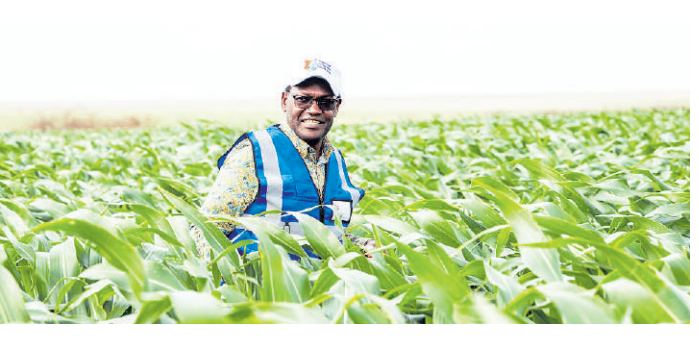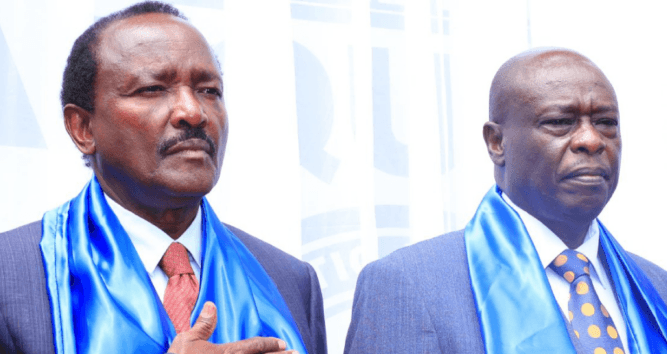
 National
Treasury PS
Chris Kiptoo at
Galana Kulalu
/CHARLES
MGHENYI
National
Treasury PS
Chris Kiptoo at
Galana Kulalu
/CHARLES
MGHENYI
Kenya's quest for
food self-sufficiency has received a significant boost following a Sh12.5
billion private sector investment in the Galana-Kulalu Food Security Project,
executed under a Public-Private Partnership model.
The National
Irrigation Authority, backed by Sh519 million from the National Treasury, has
already delivered a 600,000m³ water reservoir capable of irrigating 10,000
acres.
The water reservoir
has attracted a major investment from Selu Limited, which will, in the initial
phase, develop 20,000 acres under the Sh12.5 billion funding package.
Covering a vast 1.5
million acres across Kilifi and Tana River counties, the Galana Kulalu project
is poised to reshape the country’s agricultural landscape by increasing food
production, creating thousands of jobs, improving rural livelihoods, and
providing agro-industries with a steady supply of raw materials.
National Treasury
Principal Secretary Chris Kiptoo and Irrigation PS Ephantus Kimotho recently
toured the site to assess ongoing work and meet stakeholders.
“If the entire
20,000 acres are put under maize, we expect an annual yield of 70 bags per acre
— about 1.4 million bags in total. At the current market price of Sh4,000 per
bag, that translates to Sh5.6 billion in yearly income,” Kiptoo said.
He emphasised that
the project stands as a model of delivering major development under constrained
fiscal conditions.
“With the
national budget stretched to finance education, healthcare, and debt
repayments, we cannot fund every strategic project through public coffers. This
is why PPPs are essential, especially for commercially viable ventures like
Galana Kulalu,” he added.
Kiptoo said tapping
into the full potential of the 1.5 million acres will not only strengthen food
security but also reduce imports, save on foreign exchange, and boost incomes
for farmers in the region.
He also disclosed
that further investments are on the horizon, including the Sh35 billion Galana dam,
whose contractor has already been identified.
“We are working
closely with the Ministry of Water to fast-track the project. Once completed,
the dam will supply sufficient water to lure more investors and encourage other
government agencies to bring projects here. This is the way forward,” Kiptoo
said.
He commended the
State Department for Irrigation for its prudent use of Sh519 million to develop
critical water infrastructure.
PS Kimotho reported
that a new intake has been completed, enabling the National Irrigation
Authority to take command of 10,000 acres in the initial stage.
Part of Selu’s
investment will go into water storage, irrigation systems, and on-farm roads to
improve movement of produce within the expansive project area.
“This is a
multi-agency initiative. The Kenya Rural Roads Authority is constructing a
bridge that will greatly ease the transport of goods. Right now, we have to use
Baricho bridge, which is seven kilometres away, a challenge that slows
operations,” Kimotho said.
He further revealed
that Selu has engaged a Korean company to install a 2.5-megawatt solar water
pumping system, replacing the current diesel-powered setup.
Meanwhile, the Rural
Electrification and Renewable Energy Corporation is developing a power plant
expected to go live in June 2026, lowering production costs and encouraging
higher output.
Kimotho outlined
the project’s phased expansion plan. “In Phase One, we are utilising the normal
water flow to irrigate 10,000 acres. Phase Two, after the dam’s completion,
will see expansion to 32,000 acres. Phase Three, once the high grand fall is in
place, likely within five years, will open up an additional 500,000 acres for
irrigation,” he said.
INSTANT ANALYSIS
The Sh12.5 billion
investment in the Galana Kulalu Food Security Project signals a bold step in
Kenya’s shift towards large-scale, privately-backed agriculture. The PPP
approach offers a viable solution to budget constraints while tapping private
capital for strategic food production.















